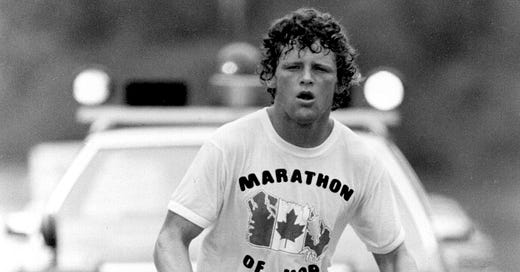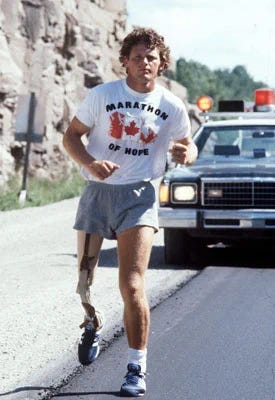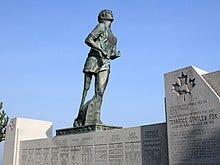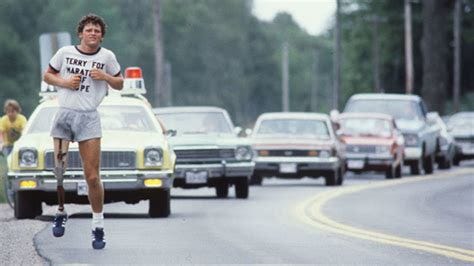A tribute to Terry Fox: Canada's greatest sports hero
The greatest sports hero isn't the professional athlete who wins the most championships
It's the athlete who sacrfices his body for something greater than himself and who inspires others towards greatness in mind, body, and spirit.
That's why Terry Fox is the greatest sports hero.
Haven't heard of Terry Fox? Let me catch you up quickly.
Terry was a sports loving kid who entered university as a high level athlete training to become a gym teacher. He loved sports and wanted to dedicate his life to teaching children their value. But Terry had a larger battle on his hands.
After a nasty car accident that left his right knee in tremendous pain he develop a type of cancer there at age 19. He was placed in a childrens cancer ward and spent the next 16 months battling through chemotherapy and radiation. He won that initial battle despite having his right leg amputated above the knee. Lying in his bed knowing he would soon be free while children younger than him would never leave that cancer ward profoundly affected Fox. In his mind he knew what he needed to do, but it was so crazy that he didn't tell anyone.
Here are Terry's own words on how that experience in the Cancer ward changed him and solidifed his desire to take on a phyiscal challenge even able bodied people would think was too much for them. “I soon realized that that [beathing my own cancer] would only be half my quest, for as I went through the 16 months of the physically and emotionally draining ordeal of chemotherapy, I was rudely awakened by the feelings that surrounded and coursed through the cancer clinic. There were faces with the brave smiles, and the ones who had given up smiling. There were feelings of hopeful denial, and the feelings of despair. My quest would not be a selfish one. I could not leave knowing these faces and feelings would still exist, even though I would be set free from mine. Somewhere the hurting must stop....and I was determined to take myself to the limit for this cause.”
What was that limit?
Run a marathon.
Everyday.
Across Canada.
Canada is a STUPID big country. Terry was going to run along the famous Trans Canada Highway a 7,476 km (4,645 mi) road that stretches the country from East to West Coast. His goal was to raise 1 dollar from every Canadian citizen to donate towards cancer research. At the time that was 24 million dollars.
Terry ran an incredible 5,373km (3,339 mi) reaching Thunder Bay, Ontario. With little fanfare at the start, by the time he hit the major urban centres in Quebec and Ontario thousands of citizens lined the streets to support Terry and witness his determination in person.
On September 1, 1980 Terry couldn't ignore the pain any longer. Shortness of breath and chest pains had become debilitating and he asked to be taken to hospital. The cancer had returned and spread throughout his lungs. He never left the hospital.
After numerous therapies and transport back to his home provine in British Columbia he succumbed to the cancer and died on June 28, 1981. At the time he stopped his run he'd raised over 1.7 Million for Cancer research. At the time of his death that number swelled to 23 million, pretty close to his original goal of 1 dollar for every Canadian.
There is no better representation of a sports hero than Terry Fox
Now that you know a bit of his incredible story I want to break down WHY this story hits all of us in the heart and why his example is above and beyond what other athletes can represent as heroes.
In my university class we talked about how athletes represent heroism through their performances. They aren't 'literal' heroes like firefighters but their sacrifices are imitations of true heroes. That imitation does inspire the rest of us to look inside ourselves and wonder how we can follow their example.
Terry Fox is a real hero. He put his life on the line and bore tremendous physical struggle as his medium to communicate his ideals to the world. There's 2 ways to understand why he's a real hero and not just a representation of one
1. Extraordinary Physical Sacrifice
When Terry started on the run he had an enlarged heart. Doctors warned against his efforts. Even the Canadian Cancer Society was skeptical about his ability and the damage he would do to his body, even though they were the primary beneficiary of his charitable endeavour. Add onto this the excruciating demand placed on his body from his awkard running gait due to his prosthetic leg and it was a recipe for disaster.
Terry knew this and defiantly started anyways.
He fought through blisters, heat stroke, bruises, shin splints, his one knee became inflamed and swollen, he developed painful cysts on his stump, not to mention tendonitis and dizziness spells. He slept in a camper van and ate hot meals cooked inside of it.
HE NEVER TOOK ONE DAY OFF.
Running in gale force winds by the ocean, through swampy humid conditions in the summer, and everything in between you could imagine. He refused donations from corporations that would have made his run more comfortbale. He did not want anyone to profit, himself included, from the run. Whatever help he did accept came with no strings attached.
Every chance he had to take the easy road he made sure to boldly take the hard road. No athlete takes their body to this limit and finds praise. We don't want to see athletes literally killing themselves in their sport. Look at all the rules that improve safety over time in all sports.
But that's why Terry is a REAL hero. He risked his life and ultimately paid with it for his athletic goal. The fact he didn't finish the marathon is a testament to this heroism. He did not want anyone else to finish it for him.
Thats why in September of 1981 the first Terry Fox Run was started. Now each year we continue on the run in his memory and to secure his legacy. That's the other reason we know he's a true hero
2. Honour through Representation and Imitation
Pro Atheltes represent and imitate real heroes. Every September people of all ages and abilities line up to run 5km in the name of Terry Fox. We are the ones who imitate him and what his athletic feat represents.
That 1981 run saw school children across Canada take time off thier days to fundraise in Terry's honour. 300,000 partipants raised $3.5million in that one day. The run grew so large that it escaped Canada's borders. In 1999 there were Terry Fox runs in schools in 60 different countries raising $15 million.
Terry Fox statues dot the Canadian landscape. School, parks, bridges, roads, and other important civic areas are named after him. He's often proclaimed as the greatest Canadian in popular survery and made for TV specials. Canada as a country exists on sports myths for our national character (I wrote a book on it "Canada's Holy Grail).
But it's not the vane superstar athlete we admire. It's the hockey captain who stands up for his teammates and soldiers through physical pain to provide and inspirational example for his team.
Terry Fox embodied that character better than any athlete of the 19th, 20th, and 21st centuries. That's why he's the greatest sports hero.
Today is Terry Fox Day. If you want to honour a man who showed what heroism through sport looked like go and run, walk, bike, wheel, skate, or move however you desire (some people rollerblade) a 5km in his memory today. When someone says athletes aren't real heroes you tell them about Terry Fox







